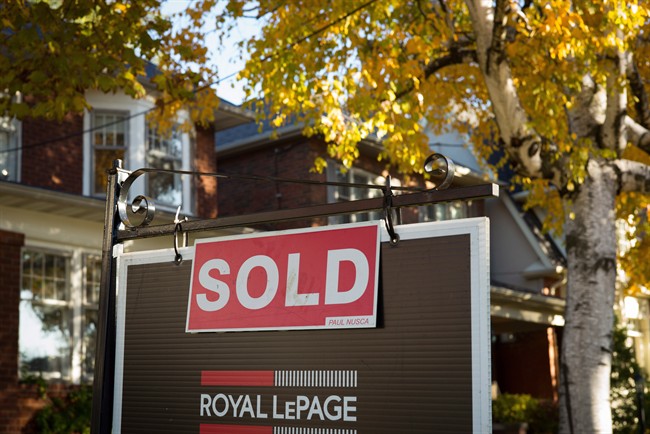A new real estate forecast for Canada predicts ups and downs ahead in 2017: Vancouver will slump, the GTA will soar, and Alberta should see some recovery after a rocky few years.

Real estate in Canada’s largest markets became increasingly unaffordable for many in 2016, and the spectre of a crash loomed.
“The price of a home in Canada increased 13.0 per cent year-over-year to $558,153 in the fourth quarter of 2016 – the highest year-over-year national home price increase recorded in over a decade,” stated a Royal LePage forecast released Thursday.
Among measures to ease the risk of a shock was B.C.’s new foreign buyers tax and the federal government’s tightening of mortgage lending rules. At the same time, both B.C. and Ontario created new incentives for first time home buyers.
Here’s a look at what 2017 has in store for Canadians from coast to coast.
Alberta
There is light at the end of the tunnel for Alberta home owners dealing with a depressed economy following the oil crash.
“While we don’t anticipate a strong housing rebound, we are calling 2016 as the bottom for this correctional phase of the cycle,” said Royal LePage president and CEO Phil Soper in the forecast.
The economic improvement is thanks to a rise in oil prices, bolstered by the OPEC agreement to cut production globally.
Perhaps surprisingly, the oil slump has not ravaged housing values too badly in Alberta over the last few years, Royal LePage stated, but it has diminished demand.

House prices in Calgary are expected to stabilize this year, the Calgary Real Estate Board (CREB) said Wednesday in its annual forecast.
Calgary has had the highest unemployment rate in Canada for six months straight; that needs to change in order to see true growth.
“One of the key components to this turnaround in the housing market is if labour market conditions start to improve,” said Ann-Marie Lurie, chief economist at CREB.
READ MORE: Why more Chinese investors are buying Calgary real estate
“We need to start having job growth in this city before we can see a true shift in our housing market.”
Saskatchewan has also taken a hit from low oil prices, however a solid year for agriculture has kept the housing market afloat.
Ontario
Ontario has seen incredible growth in recent years, and that’s not expected to change in 2017.
The GTA saw a 16.1 per cent year-over-year spike in prices. Some areas around Toronto have seen “Vancouver-like” growth over the last year: Richmond Hill ended 2016 with home values 30 per cent higher than a year before.
“There is no relief in sight for the GTA – forward momentum and supporting fundamentals in the region are that strong,” said Soper.
With prices increasingly pushing homes beyond reach, first time home buyers are also being shut out of the lower end of the market due to diminishing condo inventory.
READ MORE: Here’s how much mortgage payments will go up as banks hike rates
While it might seem like condos going up on every corner of Canada’s largest city — they are likely already all sold out, said Brad J. Lamb, president and CEO at Lamb Development and Brad J. Lamb Realty.
There are about 670 condos for sale in Toronto this January, compared with 1,450 units last January and 2,200 in January of 2015, Lamb said.
WATCH: Nearly half of first-time home buyers, and those looking to upsize, need financial help from family
“One of the reason prices went up 17 per cent last year was because there was not enough product to go around and keep the market happy,” said Lamb.
Supply has now fallen, year over year, by more than half.
“We’re going to have a huge problem in prices this year going up. Last year will look like nothing compared to this year.”
Lamb predicts GTA prices will only skyrocket in the coming years.
“Our prices will be well in excess of Vancouver’s prices in five years,” said Lamb. “And there’s nothing anybody can do to stop it.”
British Columbia

B.C. largely dominated the real estate conversation in 2016, and in 2017 the trend will reverse as home values slide. That being said, prices are expected to recede to levels seen in early 2016 — still the highest anywhere in the country.
READ MORE: Vancouver home prices to fall as much as 20 per cent: bank
“Eroding affordability in B.C.’s Lower Mainland has reached unsustainable ground,” said Soper.
“While the cost of a home in Greater Vancouver will remain the highest in the country, a modest price reset will provide much needed relief in the Lower Mainland and help reignite overall buyer activity in the region.”
While prices somewhat recede, the general mood isn’t too panicked said Dan Morrison, president of the Real Estate Board of Greater Vancouver.
“The fundamentals for Vancouver are still strong — we still have more people moving here than we’re building places for, interest rates are still low, the Canadian dollar is still putting Canada on sale for the rest of the world,” Morisson said.
Meanwhile, prices continue to rise in Victoria due to lack of supply.
READ MORE: CMHC issues ‘red’ warning for Canada’s housing market
“Our economy is one of the best in the country right now,” Victoria real estate board chief Mike Nugent told the Canadian Press Monday. “We’ve got lots of jobs happening in all sectors. That’s attracting everybody.”
After a record breaking year in parts of the Okanagan, Kelowna’s real estate market is predicted to somewhat soften in 2017.
“We’re still going to see a strong market,” Elton Ash, Regional Executive Vice President of RE/MAX Western Canada told Global News Monday. “We’re predicting a 4 per cent price increase on average in Kelowna and overall sales will remain relatively strong as well.”
Manitoba, Quebec and Atlantic Canada
Manitoba’s economy is expanding and the province is expected to see low single-digit house appreciation in 2017.
Quebec’s economy is expected to grow in 2017, along with the price of its homes, at least in major centres.
Newfoundland and Labrador is likely to see much of the same in 2017: further home price declines along with the economy. However, its regional neighbours will see growth.
“New Brunswick, Nova Scotia and Prince Edward Island are expected to achieve economic growth in the coming year, along with continued residential housing market gains,” Royal LePage forecasted.












Comments